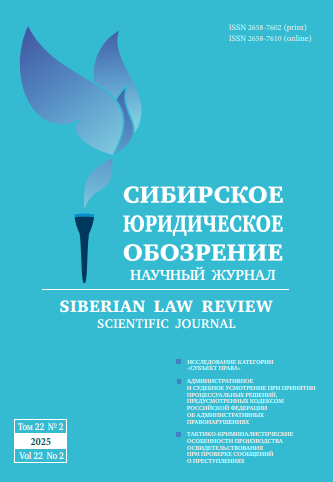Criteria for Decent Social Security: Theory, Legislation, and Law Enforcement Practice
- Autores: Fedorova M.Y.1
-
Afiliações:
- Ural State Law University named after V. F. Yakovlev
- Edição: Volume 22, Nº 2 (2025)
- Páginas: 240-256
- Seção: PUBLIC LEGAL (STATE LEGAL) SCIENCES
- ##submission.datePublished##: 07.07.2025
- URL: https://journal-vniispk.ru/2658-7602/article/view/343637
- DOI: https://doi.org/10.19073/2658-7602-2025-22-2-240-256
- EDN: https://elibrary.ru/DMYQYK
- ID: 343637
Citar
Texto integral
Resumo
This article examines the constitutional foundations of social security, relevant provisions of Russian legislation, and their practical application, taking into account the constitutional amendments of 2020. The objective is to define the concept of decent social security and to develop a system of criteria for its evaluation. The study employs a systematic, historical-legal, and formal-legal methodology. The starting point for establishing criteria is the constitutional principle of the welfare state, which has been interpreted by the Constitutional Court in connection with various forms of social benefits. The constitutional right to social security is closely intertwined with the right to human dignity. Accordingly, social security may be considered “decent” if it provides individuals with payments and services that uphold their dignity, help maintain their health, support a socially active lifestyle, and ensure the exercise of their right to benefits under legally established terms and through effective administrative procedures. To assess whether social security meets the threshold of decency, a system of criteria must be developed, grounded in the specific nature of the right to social security and the legal and organizational mechanisms of its implementation. The scope and content of the subjective right to social security form its direct (immediate) criteria. Indirect (structural and institutional) criteria assess the efficiency of the national social security system in terms of its comprehensiveness in mitigating social risks. The principal direct criterion is the socially acceptable level of social security. In Russia, this is currently expressed through the concept of the subsistence minimum, which has an economic dimension and reflects the lowest acceptable level of basic needs satisfaction. For certain categories of beneficiaries, the economic criterion is further supplemented by legal considerations – such as special needs, legal status, or the specific conditions for acquiring entitlements within the mandatory social insurance system. In addition, decent social security is subject to legal criteria, which play an important role in determining, for example, compensation for moral harm in disputes arising from social security relationships – particularly where citizens’ rights to receive benefits and services are exercised in accordance with the law and proper procedures.
Sobre autores
Marina Fedorova
Ural State Law University named after V. F. Yakovlev
Autor responsável pela correspondência
Email: fmulawkc@mail.ru
ORCID ID: 0000-0002-3680-759X
Professor of the Department of Labor Law, Doctor of Legal Sciences, Professor
Rússia, 21 Komsomolskaya str., Yekaterinburg, 620137Bibliografia
- Bogdanova N. A. Modern Catalogue of Fundamental Human Rights: International and National Ways of Filling. Moscow University Bulletin. Series 11. Law. 2010;1:41-57. (In Russ.)
- Machulskaya E. E. Adequate Social Security as One of Strategic Aims of the International Labor Organization. Social and Pension Law. 2021;1:48-53. https://doi.org/10.18572/2070-2167-2021-1-48-53 (In Russ.)
- Krotov V. V. The Dignity of the Individual in the Focus of Modern Doctrine and Practice. Journal of Russian Law. 2023;27(2):124-135. https://doi.org/10.12737/jrp.2023.022 (In Russ.)
- Astaeva M. G. Evaluative Concepts as a Part of the Conceptual Framework of Social Security Law and Their Impact on the Efficiency of Legal Provisions on Social Security. Social and Pension Law. 2024;1:16-22. https://doi.org/10.18572/2070-2167-2024-1-16-22 (In Russ.)
- Istomina E. A. The Concept of Social Risk and Its Influence on Legal Regulation of Social Security in Contemporary Conditions. Yekaterinburg: Learning and Teaching Centre of the Ural Polytechnic Institute Publ.; 2019. 370 p. (In Russ.)
- Azarova E. G. The Right of Citizens to Fair Social Security. Journal of Russian Law. 2022;26(8):77-92. https://doi.org/10.12737/jrl.2022.085 (In Russ.)
- Putilo N. V. Decent Life and Sufficient Life Quality: History of Political and Legal Ideas and the Modern Practice. Social and Pension Law. 2022;2:12-17. https://doi.org/10.18572/2070-2167-2022-2-12-17 (In Russ.)
- Erdelevskii A. M. Compensation for Moral Harm: Analysis and Commentary on Legislation and Judicial Practice. 2nd ed. Moscow: BEK Publ.; 2000. 237 p. (In Russ.)
- Dmitrieva L. A. Identity and Quality of Life in the Structure of Psychological Security of the Employee of the Investigatory Committee of the Russian Federation. Russian Investigator. 2014;14:23-26. (In Russ.)
- For citations:
Arquivos suplementares












